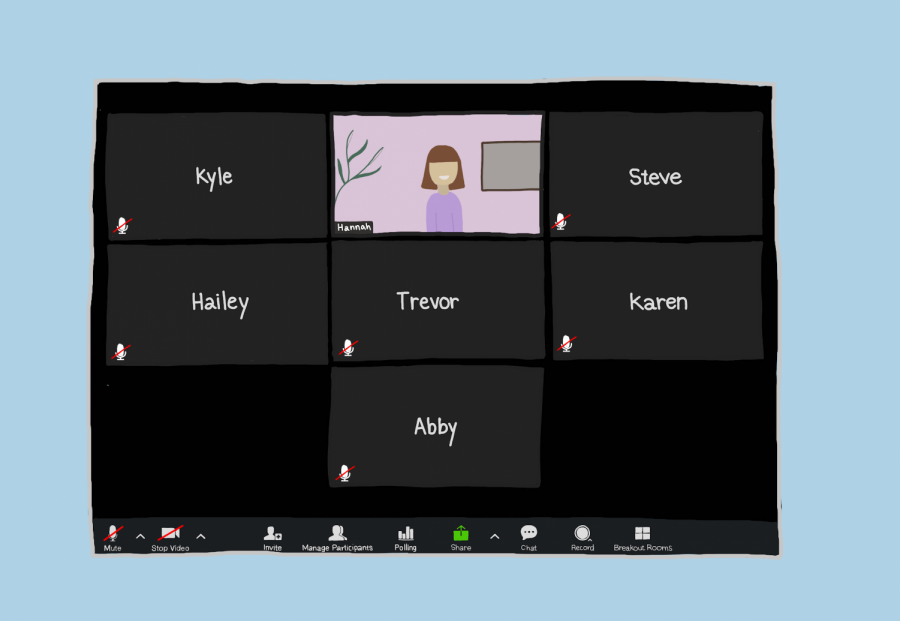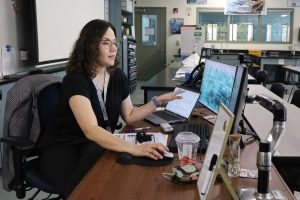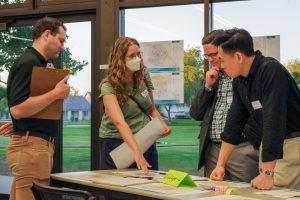How COVID-19 killed student engagement in clubs
GLOOM AND ZOOM: Clubs are overwhelmed by low participation during meetings.
April 23, 2021
Entering high school as a doe-eyed freshman with hands clutching my backpack straps, I found myself constantly receiving the same piece of advice: get involved with as many clubs as possible. I remember buzzing around with genuine exhilaration, feeling inspired by Northwood’s passionate clubs—and now, as a high school junior, I wonder where they’ve all gone.
Don’t get me wrong, the majority of our clubs on campus remain vibrant communities for students to explore their interests and provide a welcoming environment for all. But with the hypercompetitive nature of college admissions skyrocketing, the list of Northwood clubs has increasingly fallen prey to empty shells of resume-boosters, maintaining neither the engagement of club members nor the interest of the board.
With the COVID-19 pandemic, Northwood pushed all student-led clubs to follow a strict virtual-only policy. Since clubs can no longer track student engagement by taking attendance for in-person meetings, ASB aims to regulate student engagement within clubs by receiving feedback from club advisors and tracking meeting minutes.
“We have sent out ‘tasks’ for the clubs to complete, allowing us to track which clubs are actively meeting their deadlines and show passion for their causes,” co-Clubs Commissioner junior Jasmine Chhabria said. “ASB ensures that our student body stays involved by hosting events like the Virtual Club Fair series and promoting clubs through Charitable Clubs posts.”
It would be inattentive for me to disregard the many Northwood clubs whose efforts have kept students engaged during difficult times. Some have created online events or tournaments, whereas others continue to hold meetings and provide a safe community for its members. I also sincerely applaud Northwood’s diligent attempts to monitor student engagement despite facing difficult circumstances, and appreciate our Club Commissioners’ efforts to hold clubs accountable. Yet despite these measures, some clubs have managed to slip past the checks.
Let’s take a look at one student-led Northwood club, whose name remains anonymous for the sake of confidentiality. This highlight doesn’t aim to target that club in particular, but rather to shed light on a larger issue plaguing our student groups.
A quick glance at the 2020-21 Club Directory offers a list of the 74 student-led clubs on campus. A slide dedicated to the unnamed club in question contains, among many things, links to a social media account, the club email address and a Zoom meeting link. In February, my inquiries about joining the club were sent through social media, email and even attempts to contact the president(s) directly. All were met with silence.
Puzzled, I then turned to the club advisor through email, wondering if there somehow was a communication error. A few days later, a response in my inbox confirmed that the club “hadn’t met in a year or two” and the club advisor “was surprised that they still existed on paper somewhere.”
How could a group who had apparently not met “for a year or two” still be actively recognized as a full-fledged club?
Clubs like these have become increasingly common—and it’s not Northwood-specific. In the affluent, education-prioritized city of Irvine, high school students have always had college admissions on their mind. The COVID-19 pandemic has simply accelerated the usual trend: Getting into your dream college gets harder every year. With newly adopted changes in standardized test requirements, the uncertainties of the college application process and the landslide of distraught lives due to the pandemic, the Class of 2025 has become the victim of record-low acceptance rates.
With such strong competition, it’s no wonder that high school students would find themselves asking, “What looks good on my resume?” instead of, “What am I really passionate about?”
A hunger to impress admission officers at competitive colleges may thus move students to create a new club. After all, “president” is a noteworthy title. Once their clubs are approved and have become another shiny extracurricular on their resume, students might very well leave their clubs and move onto the next endeavor to boost their resume. And with the chaos of the pandemic, leaving your club has never been easier.
“A few club presidents don’t show up to the presidents’ meetings and some clubs don’t respond to emails or messages from their members,” president of Sports Analytics club senior Henry Jia said.
With the limitations of the pandemic, club presidents and board officers need to take action by creating new events and dedicating the work necessary to keep their members engaged in a virtual setting. Clubs should continue to meet on a regular basis and are responsible for developing thoughtful agendas to keep their meetings worthwhile and maintain the engagement of club members.
It’s up to board officers to take over the reins of their own clubs and they must, ultimately, just care. The few clubs whose board officers and members have abandoned with indifference must step up and take action, or Northwood may become a heartless campus without passion or drive.


























































